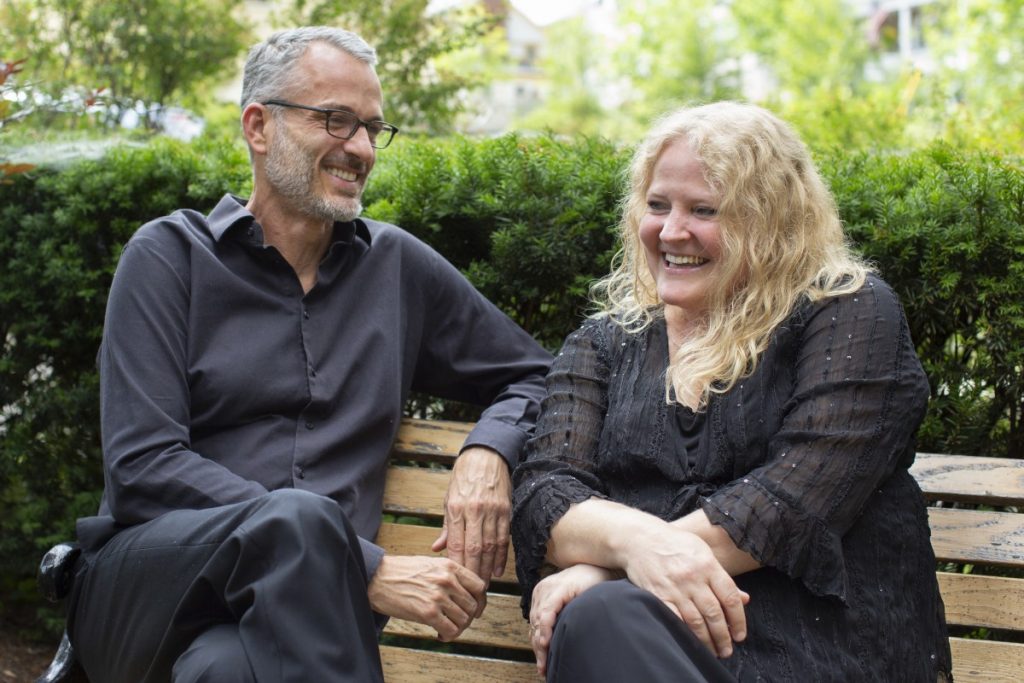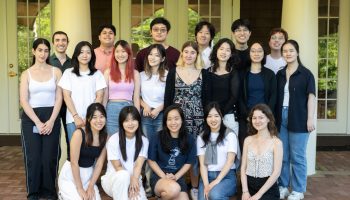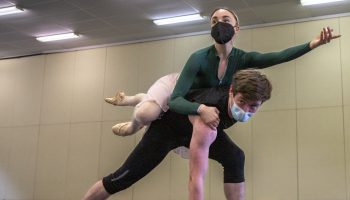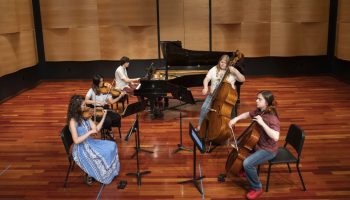
As students in Chautauqua’s School of Music, John Milbauer and Nikki Melville played their first duet together in 1992. Now co-chairs of the School of Music’s Piano Program, they have played together countless times, learning the ins and outs of each other as musicians and people.
With more than 1,600 miles between their pianos, this year’s unprecedented performance put their knowledge to the test. According to Melville, they passed with flying colors.
“After doing this, I think we can do just about anything together,” Melville said, “(and) never again will I take the energy of him beside me for granted.”
Milbauer and Melville will give a joint piano recital at 4 p.m. EDT Wednesday, July 8, on CHQ Assembly’s Virtual Porch.
Instead of playing solo renditions, the duo decided to stick with what they know best. To mimic their usual side-by-side setup, the performance will play on a split screen. To achieve this, one person recorded their part of the duet first and sent it over to the other person, who played along to the first recording.
“We had no click track, metronome or anything,” she said. “It was really hard. It felt like the first person was playing into a vacuum, while also having to pace themselves to fit the other person’s part in. What you learn is that human beings have very different concepts of time.”
Milbauer and Melville will play three pieces: selections from “The Dolly Suite” Op. 56 by Gabriel Fauré; “Rondo” in A major, D. 951, by Franz Schubert; and “Sonata for Two Pianos,” in D major, K. 448, composed by Mozart.
The two movements they chose from “The Dolly Suite” are “Le jardin de Dolly” and “Le pas espagnol.” They have performed both together before.
“Le jardin de Dolly” delivers the enchanting “music of nature,” according to Melville. A phrase from Fauré’s first violin sonata, written some 20 years earlier, also appears in the work. “Le pas espagnol” is an “exhilarating allegro,” Melville said, full of Latin notes and vibrant color.
“They are gorgeous pieces, but we love playing them together because each selection is short and really fun in my opinion,” Melville said. “It’s a great way to set the palate for the rest of the performance. It gets the energy up rather quickly.”
Next on the program is “Rondo,” which Schubert modelled using the lyrical finale of Beethoven’s piano sonata. The theme of the piece echoes Beethoven’s in its similar harmonic pattern, where the melody’s initial phrase is followed by a “bolder ending” in terms of octaves.
Melville said this piece is a favorite of Milbauer’s — and was particularly difficult for her to play.
“Because he loves this one so much, he went ahead and played it first,” she said. “He was playing all of these melodies and rubatos with such expression and trying to fit my accompaniment in that … felt so unnatural. It was a good example of something particularly hard to do in this format.”
For a more “substantial piece,” Melville said they will finish their recital with 20 minutes of Mozart’s “Sonata for Two Pianos.”
“(Mozart’s sonata) is a staple in the two piano repertoire,” Melville said. “I would never call anything by Mozart delicate, but this piece is very finely etched. The decisions are very small. You are making choices about shape and timing and nuance on almost a note-by-note basis.”
Melville considers this piece a testament to Mozart’s role as one of the most “transparent and exacting of composers.”
“Playing Mozart is very personal,” Melville said. “Making Mozart really speak is an individual thing, so then trying to do that with two people together — and finding the place where both people are feeling authenticity in how that piece works, is quite challenging.”
Just by virtue of circumstances, the performance will be far from perfect, but Melville said its imperfections are part of a larger point.
“It was really important for us to be models of the real world for our students,” Melville said. “I tell my students time and time again, ‘If you wait for everything to be perfect before you decide to perform, you will never perform.’ Own it, commit to it and do your very best. That’s all we can do.”




